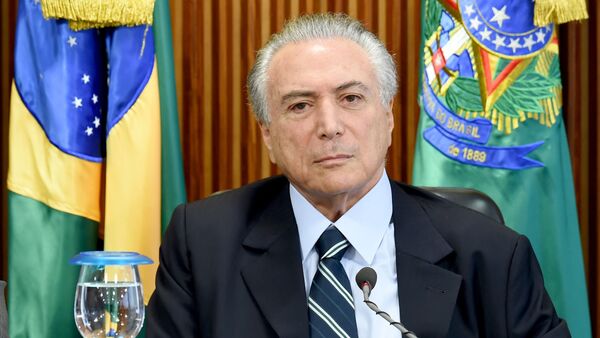On Wednesday, Brazil’s Senate completed a 20-hour debate before voting 55 to 22 to suspend President Dilma Rousseff for 180 days pending an impeachment trial. The head of the country’s Workers Party and the winner of four consecutive elections, Rousseff was stripped of her powers on Thursday and faces the specter of a full impeachment within six months. The Senate will need to assemble a two-thirds vote, 54 of 81 senators, to permanently ban her from office.
Vice President Michel Temer, of the center-right Brazilian Democratic Movement Party, ascended to the presidency on Thursday despite recent polling showing that less than 2% of Brazilians intend to vote for him in the 2018 election.
Temer announced that his transition government will form a coalition with the country’s right wing parties and will move rapidly to privatize the country’s natural resources while implementing unpopular austerity measures. The beneficiary of the impeachment vote, which many are calling a coup, claims these measures are necessary to lift Brazil out of its worst recession in decades.
Rousseff Suspension Viewed as Illegitimate Following Bizarre Events
"The saddest day for Brazil’s young democracy," was how one Brazilian Senator described Wednesday’s vote to suspend Dilma Rousseff. The chamber voted on Wednesday after a debate that featured props, gangrene comparisons, and the Senate president’s tooth falling out of his mouth on live television.
An international audience looked on in disgust as nearly every one of the 81 senators took the maximum allotted time to speak, not to call for the impeachment of Rousseff, but to talk about their own candidacy for reelection.
The reality-show atmosphere of the Senate rivaled only the debate in the Lower House in April, as legislators dedicated votes to gods and grandchildren, with reports that lawmakers accepted bribes in return for a vote to impeach. Some commented that the Brazilian political power play made the American electoral convulsion look like an exercise in decency and propriety.
The impeachment effort was manufactured by Michel Temer’s two Brazilian Democratic Movement Party allies, deposed Speaker of the House Eduardo Cunha and President of the Senate Renan Calheiros. Cunha was dispatched from office last Friday by order of the Brazilian Supreme Court as he faces corruption charges traced to 23 Swiss bank accounts and Panama-based shell corporations.
For a moment last week, it appeared as if rationality had washed over Latin America’s most populous country, when acting Speaker of the House Waldir Maranhao, installed to replace Cunha, announced that the April 17 vote by the Lower House would be annulled, citing procedural irregularities. Less than 24 hours later, however, Maranaho revoked his earlier condemnation of the April 17 vote, after pressure from political allies and resistance by the Brazilian Senate, which paved the way for Wednesday’s impeachment vote.
In light of the rampant confusion and corruption engendered by the impeachment proceedings, with over 60% of those voting to impeach Rousseff themselves facing corruption charges, Brazil’s Attorney General Jose Eduardo Cardozo issued an emergency petition to the country’s Supreme Court calling for an injunction against the proceedings and an annulment of the entire process. The Supreme Court ruled against Cardozo’s petition and the vote proceeded on Wednesday without further interruption.
Impeachment or NSA Supported Coup?
Brazilians have taken to calling the impeachment a US-sponsored coup, citing the source material that started the circus. In 2014, WikiLeaks revealed that the NSA had undertaken surveillance efforts against the Brazilian government and state-owned oil company PetroBras, including directly spying on the communications of President Rousseff. The incident created a significant diplomatic row between Brazil and the United States, but also set into motion the first act in the impeachment imbroglio.
The NSA surveillance data was provided by an unnamed source to a rural Brazilian judge, who took up the so-called Car Wash investigation, focusing on kickbacks between government officials and PetroBras. The first person caught up in that investigation was Workers Party founder and former President Luiz Inacio Lula da Silva. Rousseff moved to insulate the popular Lula da Silva from prosecution by installing him as her Chief of Staff, and granting him diplomatic immunity.
Ancillary to the investigation, it was discovered that Rousseff, during her most recent reelection bid, inflated government economic data to provide the appearance that the country’s economy was recovering. The hazy, but not necessarily illegal accounting practices undertaken by Rousseff, which her supporters offer has been a common practice by previous Brazilian leaders, is the charge for which she faces impeachment.
On Friday, Loud & Clear’s Brian Becker sat down with Latin American politics expert Dr. Francisco Dominguez to discuss the fallout and response now that Michel Temer has seized power.
Will 'Social Convulsion' and Violence Erupt Following the Impeachment?
"Brazilians are really angry and fed up with the situation," said Dominguez. "They are taking actions throughout the country – organizing sit-ins at the universities, burning tires, planning boycotts, and engaging in mass demonstrations in the street."
"The social movement in Brazil is absolutely gigantic, and remember that people like Lula actually have experience organizing mass resistance against the military dictatorship back in the 1980s, so they have every possibility of making an impact," explained Dominguez. "The other crucial consideration is that the Temer government has no legitimacy, and now they want to make a coalition with the right wing which means they are going to implement neoliberal policies that reverse the social progress."
Dominguez explained that although Rousseff oversaw the country during a major economic downturn and was hardly a popular politician, the Brazilian people trusted that she was standing up for them against outside forces that wanted to push austerity measures that would strip the popular social safety net.
With Rousseff gone, Dominguez says that the people of Brazil now live in fear. "They are very frightened now that they will lose their houses, their protection under the social security system, lose the possibility of accessing the university free of charge, and lose access to medicine and Cuban doctors free of charge – the very protections that the right wing government plans to strip away," explained Dominguez.
Dominguez explained that under Rousseff’s government the country established 25 additional universities to cater to the country’s large population, ensuring that people would have increased opportunity for education. Dominguez suggests that the people will stand up to having these hard-won resources taken away.
The expert expressed that the situation remains somewhat contained in Brazil, as many suggest that the Workers Party will regain power in the 2018 elections, with the popular Luiz Inacio Lula da Silva planning to run. Dominguez offered that, if the government moved to bar Lula da Silva from being a candidate, through "trumped up legal charges," the country could erupt.






